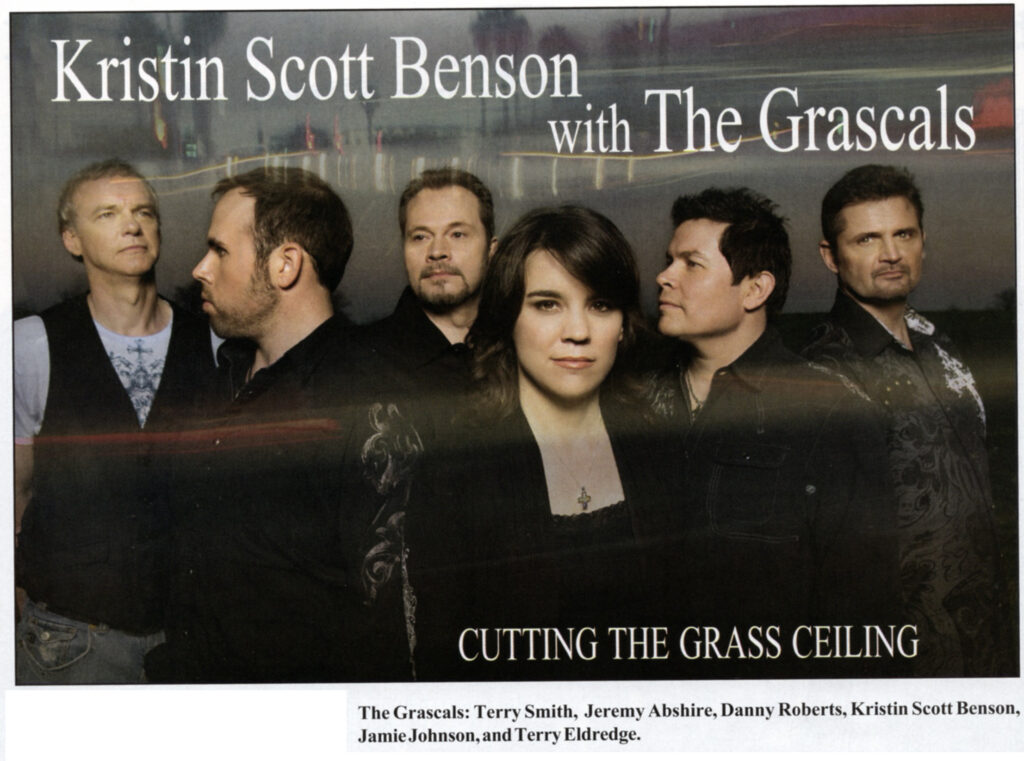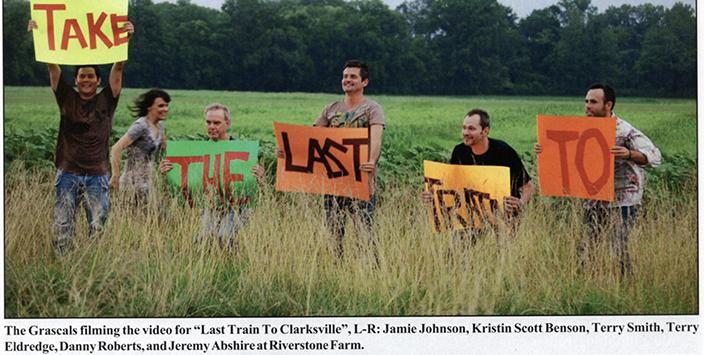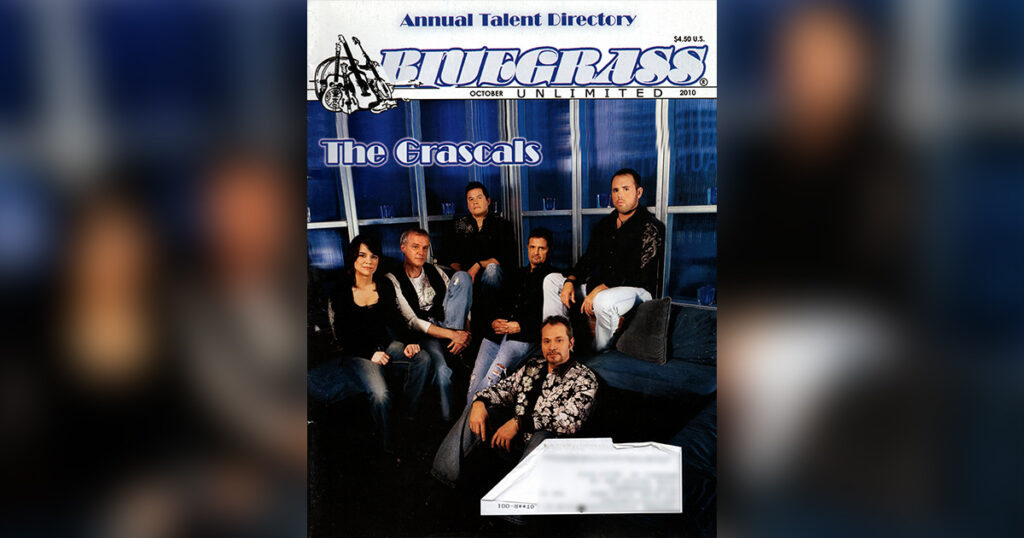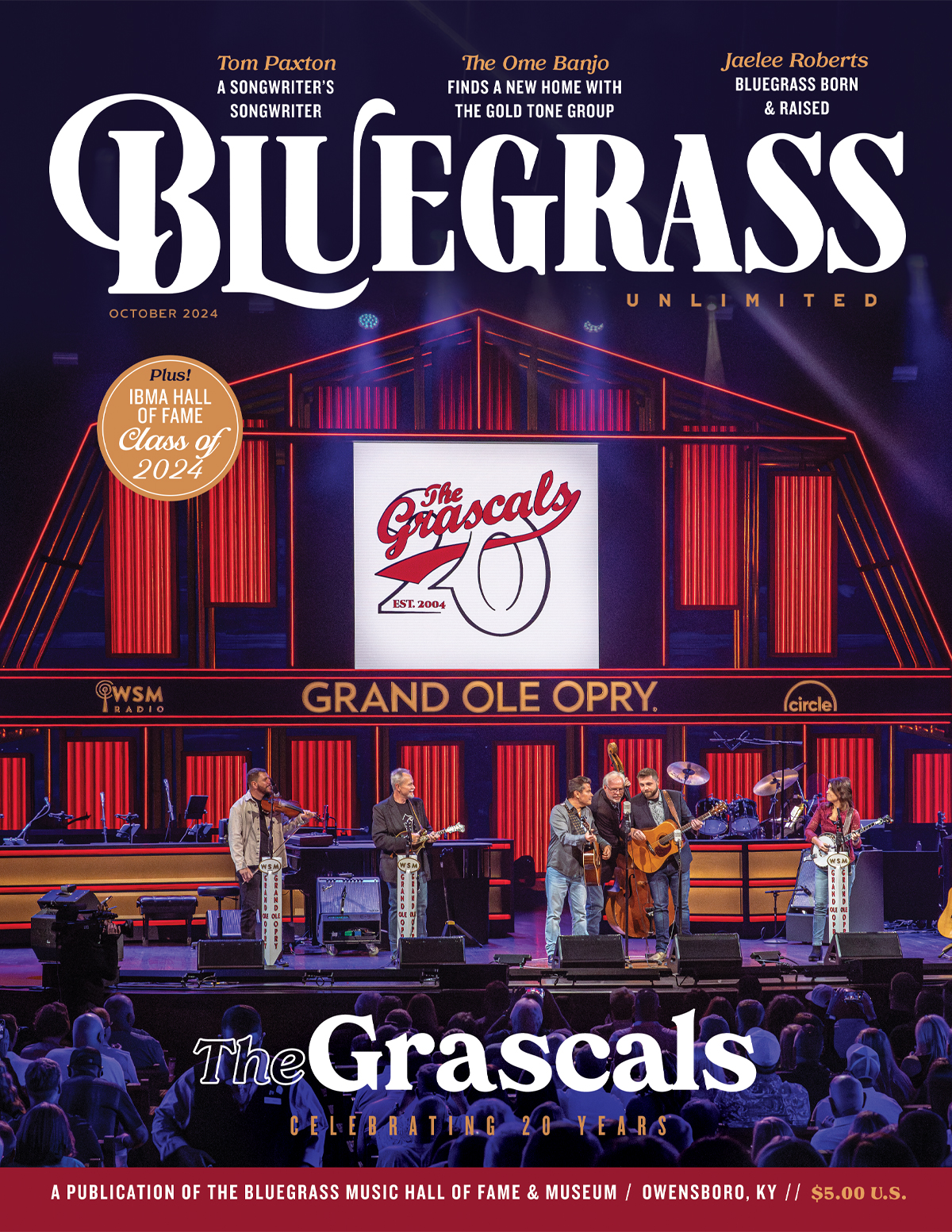Home > Articles > The Archives > Kristen Scott Benson with The Grascals — Cutting The Grass Ceiling
Kristen Scott Benson with The Grascals — Cutting The Grass Ceiling
Reprinted from Bluegrass Unlimited Magazine
October 2010, Volume 45, Number 4
It’s hard to imagine, when today bluegrass boasts headliners such as Alison Krauss and Rhonda Vincent and a host of superpickers including Alison Brown, Sierra Hull, Missy Raines, and the SteelDrivers’ Tammy Rogers, but it wasn’t long ago that women weren’t welcome in the bluegrass boys’ club. Sure, wives and girlfriends were occasionally found in bands, but women weren’t accepted on their own. I saw that firsthand in the late ’70s, playing bass for pioneering female bluegrass singer Katie Laur. Back then, a woman with a Martin D-28 leading a bluegrass band incited a reaction similar to women riding broomsticks in seventeenth century Massachusetts. Gradually, women like Laur, Betty Fisher, and Claire Lynch earned acceptance as leaders, and then came all-female bluegrass bands such as the New Coon Creek Girls.
Still, there was one grass ceiling no woman could cut through—until Kristin Scott Benson came along, that is. Almost two years ago, she joined The Grascals. Not to front the band, not to sing, not to be eye candy, but instead to drive the group with her five-string banjo. Until then, no woman had ever been hired to play one of the most defining of the bluegrass instruments in an A-list, festival-headlining, all-male band.
She joined a seasoned group that brings contemporary bluegrass with an Osborne Brothers spin to mainstream country audiences as well as hardcore bluegrassers. The Grascals first made a name as Dolly Parton’s bluegrass band and, most recently, have been opening for Hank Williams, Jr. It’s a high-profile gig, as Kristin takes the banjo where no woman has taken it before.
“We’ve got girl power now,” says Grascal singer/guitarist Terry Eldredge. “You would not believe how many fans she has. You can just tell in the young girls’ faces. They’ll come up and want their picture taken with her. They can’t believe it. ‘Wow, a girl playing the banjo and doing it and making a living at it?’ She’s a big inspiration not just to fans, but to us.”
“It is a sea change for women in bluegrass,” agrees banjo player/instructor Murphy Henry, a female bluegrass pioneer in her own right. “To my knowledge. I’ve never seen another woman really go this far in the role of a side musician. It makes her more like one of the guys in that she seems to be proving that jobs as side musicians are open to women now, that women can cut the gig.”
Murphy compares Kristin to Jackie Robinson, who broke Major League Baseball’s color line in 1947. Robinson was not just a great player; he was a very special person. Henry sees some of those qualities in the newest Grascal. “Not only is she a great banjo player, but she’s a great bandmember in that she can do all the other things, contributing in other ways, easy to get along with, always on time, just all those things that make somebody you want to travel with.”
Beginning The Journey
Growing up in a family of musicians in Union, S.C., Kristin got her start at age five playing mandolin, the instrument her grandfather, Arval Hogan, played in the old-time duo Whitey & Hogan and the Briarhoppers. In the 1930s and 1940s, the North Carolina group recorded for Decca and was offered Grand Ole Opry membership.
Young Kristin didn’t know all that when she picked up the mandolin. “It was small and we had one. that’s the reason I chose it at that age,” she explains. “I definitely grew up in a family where bluegrass was all around, but I didn’t get serious about music until I was a teenager and started playing the banjo.”
Her defining moment came on a family trip to a bluegrass festival in Dahlonega, Ga., where nine-year-old Kristin saw Doyle Lawson & Quicksilver with Scott Vestal on banjo. “That was the first year I could really remember bluegrass impacting me,” she says. “When I saw that band, it floored me and my favorite thing about it was the banjo.”
Her father, Fred, played bluegrass and she soon had a banjo of her own, only to lose it in a house fire. At 13, she got another one and her intense learning began. “I took lessons in Greenville, about a ninety-minute drive. My parents drove me. They were incredibly supportive. As a parent myself, I realize that now.”

Through the rest of high school, she was obsessed. “I love to sleep and I’m not a morning person, and I was even playing banjo before I went to school in the morning. We had a pool table and I kept my banjo on the pool table out of the case, and every time I went by it, I would play some.”
She considers herself a well-rounded kid back then, playing softball and basketball, as well as trombone in the school marching band. Then the banjo took over. “Like most musicians, I started out with a lot of interests and they just gradually narrowed down until banjo’s the only thing I was doing anymore.”
By age 15, playing a 1989 Gibson Granada she wishes she still had, Kristin was semi-professional, playing in a local gospel-bluegrass band. By senior year, she was in the all-female Nashville-based band Petticoat Junction led by Andrea Roberts, wife of future Grascals bandmate, mandolinist Danny Roberts.
She came to Nashville in 1994 to attend Belmont University and, during freshman year, played with Wild & Blue led by mandolinist David Harvey (now heading Gibson’s mandolin division) with his wife Jan and her sister Jill.
A True Band Player
By her sophomore year, she joined the Larry Stephenson Band (LSB) on the road almost every weekend. She laughs that she had to miss the first day of classes, which was also her first day with the band. It was worth it. “Larry Stephenson hiring me was monumental. For me to get to join that band at 19 years old, that was really when I got the feel of playing in a band that was busy. We played ninety shows a year. And that was invaluable. You can practice and you should practice alone, but experience in a band setting is crucial. And that’s when I really developed into a true band player.”
Stephenson says he just hired the best musician available. “Bass player Mike Bub told me about her,” he recalls. “Mike seems to know everybody. And I said, ‘Man, I don’t know about that.’ I was a little apprehensive.” Along with people possibly thinking it was a gimmick, Stephenson was concerned about changing the band dynamic by “having a female on the bus and everything. But, I went ahead and had her come over, and she was absolutely the best person that we auditioned for the job.”
He didn’t know he was helping make history. “I didn’t think anything of it at the time. She was the best person for the job. Then I come to find out I was doing something that had never been done before. Nobody was married to her, no boyfriend/girlfriend thing or anything like that. And I guess that had always been the case up to that point (with women in bluegrass bands), unless there was a Betty Fisher or a Katie Laur that had their own band.”
In 1998, when Murphy Henry made her famous “Women In Bluegrass” IBMA keynote address at the World Of Bluegrass convention, she cited Stephenson hiring Kristin as a milestone. Larry says he became a “hero to the women in bluegrass music. I walked out of the luncheon that day and everybody was patting me on the back. It was kind of weird.” It was also short-lived. “I think there were a lot of female banjo players that thought this job was always going to be a female banjo job, and when Kristin quit, I got a lot of calls from other girls, but they just weren’t Kristin’s caliber.”
During Kristin’s two stints with Stephenson she met her idol, Sonny Osborne. He was producing the LSB at Nashville’s Hilltop Studios, including her debut with the group on four tracks for Stephenson’s gospel collection, I See God. At first, Kristin admits, “I was incredibly intimidated by Sonny. Everyone is, because he has a very commanding presence. The band had prepped me for meeting Sonny. They had endless scenarios for what he could say and what could happen. And I was a little scared, but Sonny was so nice. I was incredibly relieved and they were incredibly disappointed,” she laughs.
“I liked her attitude from the start,” Sonny recalls. “I remember I told her, ‘If I hear something I don’t think is correct, I will say something or perhaps correct you.’ Her answer was direct and to the point. ‘That will be fine and I appreciate it, but I also want to have the right to refuse to use what you suggest.’ I wanted it to be correct; she wanted to be comfortable doing what she was doing. Fantastic.” They’ve been close ever since, she says. “Sonny and I have a father/daughter relationship. He and my dad were born the same year. I’m friends with him, but I also really rely on him as a mentor.”
“If I had another daughter, I would like her to be like Kristin. She is one of the most honest people I have ever met,” says Sonny. “As a banjo player, she’s a diligent worker. It’s obvious she spends a lot of time working to make it as perfect as possible, which is the most important part of being a good musician. Practice, practice, practice. Then practice some more.”
Six Degrees of Sonny
Sonny also has a long relationship with The Grascals. Two founding members, bassist Terry Smith and singer/guitarist Terry Eldredge, proudly have 25 years between them with the Osborne Brothers (13 years for Smith and 12 for Eldredge). Guitarist Jamie Johnson, who shares lead vocal and rhythm guitar duties with Eldredge, has a deep connection to their music through his older brother. “Back in 1991, my brother passed away in an accident. His name was Brad and he was a huge, huge Osborne Brothers fan. I was into other kinds of music—the Eagles, the Beatles. But he just loved these guys. I remember him every morning. I’m talking about a 15/16- year-old kid in his Fruit of the Looms with a cup of coffee sitting by the old phonograph listening to the Osborne Brothers. From Rocky Top to Muddy Bottom, I’ll never forget that album. I know that thing inside out. And when he passed away, I just converted all the records over to tape and listened to them just to keep him close to me, and I fell in love with it.” After earning his engineering degree in Louisville, he headed to Nashville to become a country star until he found himself at the Station Inn listening to Eldredge and Smith in The Sidemen. He was soon sitting in.

In late 2008, when Sonny called the guys about Kristin as a possible replacement for the departing Aaron McDaris (who’d replaced founding member David Talbot), The Grascals listened. “He said, ‘I’m telling you right now, she can cut it—she can cut the mustard. She can play anything you all want her to play and as good as anybody you’ve ever had.’ We had her come down and try out. She knew everything. We never missed a beat. It was amazing,” says Jamie.
“She came and we played like one or two songs together,” adds Eldredge. “And we were all like, ‘This is it!’ And not only just her playing, but her personality and her attitude. It’s totally lifted this band another notch or two.”
Like her mentor Sonny, Kristin plays the song, not interchangeable banjo licks. It’s a big reason she’s the 2008 and 2009 IBMA Banjo Player Of The Year and a big part of The Grascals sound, says Eldredge. “She’ll ask me when we’re working on some song, ‘How are you singing that, El? How are you doing that?’ And I’ll say, ‘You don’t necessarily have to play it just like that.’ But she’ll say, ‘I want to learn the song, the melodies of it.’ And then she adds her own thing, kind of like Sonny did.”
That work ethic is a big part of her appeal as a band member. For her audition, Kristin learned the entire Grascals catalog. “The first time we got together, we just ran through all the songs,” she says. “And luckily, they only had three records, so it was pretty easy to get up to date and know the material.”
Even so, she wasn’t quite sure just what she was getting into. “I have a cassette tape and the first time I played with these guys, it sounds like a huge party. They were insane. Everybody thinks it’s such a good act they have onstage; all the hollering and stuff. That’s not an act. They do that on my rehearsal tape. And I think that’s one of the strongest aspects of the band. They really do want to entertain. And luckily, the authentic personalities are pretty hilarious. Their attitude is, ‘We’re gonna have fun and if we do, [the audience] will.’” Back-to-back IBMA Entertainer Of The Year Awards in 2006 and 2007 confirms that approach.
Back Home on the Road
The Grascals are based in Nashville where Kristin lived until 2007, when she and her husband, Wayne Benson (mandolinist for IIIrd Tyme Out), moved back to Boiling Springs, S.C., to be closer to her mom and dad. It was a year after the birth of their son, Hogan, named for Kristin’s musician grandpa. “We couldn’t name him Arval,” she laughs. Kristin’s parents had been Hogan’s babysitters since shortly after he was born, allowing Kristin and Wayne to travel with their bands. “We were killing ourselves driving back and forth, and also Hogan was having to make those trips,” Kristin says. “Now, I have a six-hour commute to the Grascals bus, but Hogan’s near his grandparents.” Wayne’s band is based in nearby Georgia. “So his commute got a lot shorter when we moved to South Carolina. I guess I’m the martyr of the tale,” she adds with a good-natured laugh.
She’s commuting even more nowadays. First, came the recording of The Famous Lefty Flynn’s, the Gracsals fourth album for Rounder and their second with Kristin. Then came a full-scale rollout of the disc, a far more elaborate media blitz than the average bluegrass album. The Grascals had features in Country’ Weekly, an album release party with a live media showcase at the IBMA offices, plus satellite radio and cable TV appearances, as well as former WSM disc jockey Keith Bilbrey’s cooking show. In June, they braved Nashville’s hottest weather in almost sixty years to shoot a music video for “Last Train To Clarksville.”
Along with festivals, The Grascals have been playing dates with Hank, Jr. He guests on the new CD, singing “I’m Blue, I’m Lonesome,” written by his dad and Bill Monroe. The Grascals appeared on “All The Roads” from Hank, Jr.’s 2009 album, 127 Rose Avenue. They’re also on Joe Diffie’s new bluegrass CD, Homecoming.
That bond with mainstream Nashville recalls the Osbornes, who toured with country package shows in the ’60s after “Rocky Top.” It was a controversial move. To compete with country bands, the Osbornes went electric and added drums and steel guitar. Thanks to improved amplification, The Grascals’ move to arenas keeps their acoustic sound intact. But, purists will no doubt balk, as they did when they toured with Dolly. “We’re not out there on the road trying to be a country band. We’re The Grascals and we do what we do. We’re a fairly traditional bluegrass band,” says mandolinist/co-founder Danny Roberts.
“We try to stay true to ourselves,” Smith adds. “We feel we need to keep our roots in bluegrass, but we feel strongly about trying to expand and do new things. You’re not gonna please everybody. There’s some people that’s gonna think we’re getting above our raisin’, but we’re trying to go as far as we can and also stay true to what we feel we’re all about. If we try to be something we’re not, all of a sudden we’d look very uncool. And, people know. People can tell when you’re real.”
The band’s trademark is its masterful vocal trio, combining lessons from Smith’s and Eldredge’s time with the Osbornes and Jamie Johnson’s deep love of that music. “You take the things you learn and use them,” Smith says. “Basically, all the Osborne Brothers did was whoever was singing lead followed the melody. If it went down low, they went over. If it went high, they went under. And that’s pretty much what we try to do. To me the harmony just sparkles when it does that. If it’s like three lines that do the same thing, it’s kinda boring, but when they’re switching over, it just adds a little sparkle.”
“They can change [parts] during a song simply by eye contact,” says Sonny, who has seen about fifty Grascals shows. “They all understand harmony parts and just how to sing. They sound like their records. When you play bluegrass music, that’s not an easy thing.”
Fiddler Jeremy Abshire, formerly with Dale Ann Bradley, fills out the six-piece band. He replaced founding member Jimmy Mattingly when he resumed his longtime gig with Dolly Parton. The Grascals learned a lot from Dolly. “She works day and night,” Danny says. “She only sleeps three hours a night. We’d do a full soundcheck on the road every day, and every three days, she would have a new song that she had written.” He remembers her stressing the importance of good management, which most bluegrass bands lack. “She told us, ‘Always remember that eighty or ninety percent of something sure beats a hundred percent of nothing.’”
The Grascals are as serious about business as they are about their music. When the band played an event for Mobil Delvac, Jamie approached them about sponsoring a bluegrass band, a first for the massive oil company. The resulting deal raises the ante on bluegrass corporate sponsorships, as The Grascals roll down the highway in their Mobil Delvac bus, carefully monitoring oil performance for the company. The Grascals’ corporate connections also include a possible 2011 CD for Cracker Barrel, on which they hope to include many of their Nashville pals.
Honoring the Mothers
For Kristin, it all adds up to the ultimate bluegrass gig. “I don’t ever see myself leaving this band to join another band. I’ve been a musician long enough to really appreciate the positive aspects of this group. It’s just like any job. You’ve got to find the perfect balance of a million factors to make the ideal situation. Music is just one of many factors that add up to the totality of what you’re doing, and this band is tailor-made for me. And not the least is the personalities in the band and how much I love each one of these guys and how much I appreciate all the many little and big ways they make me feel a part of what they’re doing.”
Maybe that’s another way that bluegrass has changed. At 34, Kristin says she’s never faced the prejudice earlier female pickers dealt with. “I think I’ve been spared those experiences because there were people that laid the groundwork. It’s very humbling when people say you’ve broken new ground, but I don’t feel that way, because there were females like [bass player] Missy Raines. A lot of times, females do front their own bands, but she’s been mainly an instrumentalist. So, I really related to her a lot. And, I also feel a lot of the women who played before me paved the way to the extent that I haven’t felt any backlash like she did. I feel I’ve been extremely blessed. I’ve had great jobs with great guys.”
As to the next generation, to those Kristin Scott Benson wannabes crowding The Grascals’ merchandise table, she offers this: “My advice for young girls is the same as my advice for young boys. Practice. Practice hard. And, I don’t think it’s healthy to start playing an instrument because you want to be a [professional] musician. I think you need to play an instrument because you love the instrument. If it leads to a career, then that’s great, but, I think the motivation has to be purer. The focus has to be the art and not the profession. You have to love music more than you love being a musician.”
Larry Nager is a Nashville-based writer, documentary filmmaker, and musician.
Share this article
1 Comment
Leave a Comment Cancel Reply
This site uses Akismet to reduce spam. Learn how your comment data is processed.


Great article about Kristen. She is a great musician and a friendly person. It was nice to read about her background. I’ve admired her for years.